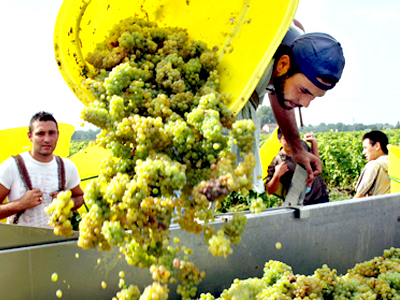
Former INS employee says proposals from both parties will be bad for legalized farmworkers ---
Michael G. Harpold has spent most of his adult life on the front lines of immigration, including serving as a United States Border Patrol officer in California’s San Joaquin Valley during the early years of the Grape Strike led by Cesar Chavez. Today, he is an author speaking about the flaws in immigration policy proposals coming from both Democrats and Republicans.
“There’s plenty of advocacy for increased numbers of immigrants and new guest worker programs, but not much discussion about the consequences,” says Harpold, a 35-year veteran of the Immigration and Naturalization Service (INS) and author of the new book Jumping the Line, which gives readers a realistic glimpse into the lives of two farmworker families.
Harpold says both houses of Congress have passed legislation creating new programs that will guarantee food growers a huge pool of new, low-skilled workers, but will do nothing to improve the lives of those already in the states working on farms. Growers will not have to pay into social security and unemployment for guest workers.
“Despite immigration reform, domestic farmworkers will continue to live as an impoverished underclass,” Harpold says. “If we want to help immigrant and U.S. citizen farmworkers, we can’t bring a new flood of low-skilled workers into the country who will compete for their jobs.”
Harpold, who served on the staff of former INS commissioner Leonel Castillo, points out where political ideology goes wrong on the immigration issue:
• Illegal immigrant farmworkers are not self-entitled freeloaders. More than half of workers employed on farms, and a huge portion of those hired in food processing and meatpacking, are not U.S. citizens or legal immigrants. Many were driven off their farms in Mexico because they couldn’t compete with American corn exports. Out of necessity more than fifty percent of farm families in Mexico have one or more family members working illegally in the U.S. Tacitly invited by unscrupulous U.S. employers seeking cheap labor, the vast majority slipped across land borders or were smuggled, facing incredible danger and hardships.
• A relaxed border policy is a bad idea. Our immigration laws have been refined over decades to reunify families, provide needed workers to U.S. business and provide a haven for political refugees. To that end, more than 1.2 million new immigrants are brought into the U.S. each year in addition to more than 40 million visitors. Liberals say the system is broken and the law is being violated because not enough visas are being granted, but there will always come a point when the country needs to say no. No system can be fair if the regulations governing it are not enforced, as has occurred throughout the past two and a half decades. Relaxing our immigration standards, as some liberals support, allows for a constant stream of new immigrants, grinding wages to the floor and guaranteeing a state of perpetual poverty for farmworkers.
• Immigrants face the same problems as U.S. citizens. The fact that manufacturing jobs have moved overseas has been a significant blow to the American workforce. Earlier immigrants from Europe had next-level jobs and industries to climb their way out of entry-level jobs, but those next-level jobs are no longer there for immigrant farmworkers. Wages for meatpackers and construction workers have fallen as those occupations have become overloaded with job-hunting, low-skilled workers. “The way out for most farmworkers means standing on a street corner near a Home Depot hoping to be hired for day labor,” Harpold says.
“Progressives need to remember that it’s not fair to invite immigrants only to have them discover the American dream is on hold indefinitely,” he says. “Conservatives need to accept that many of the estimated 11.5 million illegal immigrants in the U.S. are already deeply integrated into our economy and society. Until relatively recently, illegal immigrant farmworkers were simply integrated into the system after a period of time. Congress should enact a law allowing them to remain legally and work until they can qualify for a green card – something that’s been done in previous immigration policy.”

